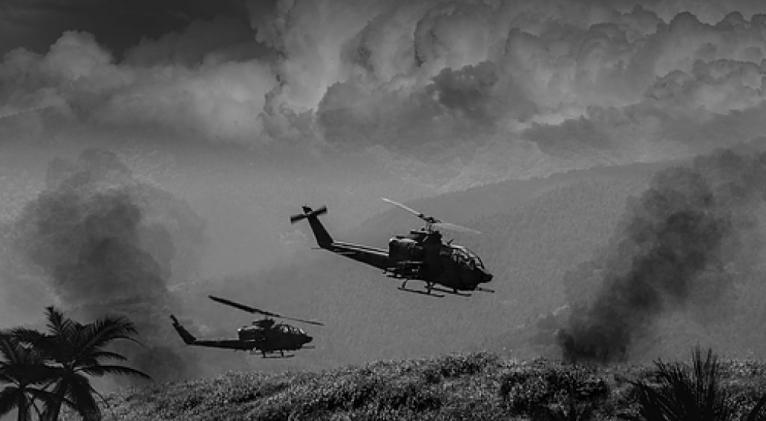The War That Won’t Go Away
especiales

“There you go again,” was one of Ronald Reagan’s favorite refrains in the 1980s, and especially in a 1984 presidential debate with Walter Mondale, to disarm his critics and to show the disdain that he held for any issues that had even a hint of liberalism.
He was also the architect of the “noble cause” historical revisionism that began the sanitizing of the Vietnam War. “Theirs was a noble cause,” were the words he used that began the long march to attempt to make the Vietnam War a good war in the minds of Americans.
It is no surprise that much sound and fury would accompany Donald Trump’s outrageous anti-feminist rant on the campaign trail when he chastised both the Democratic Party and Khizr and Ghazala Khan, the parents of Captain Humayun Khan, a soldier who died in Iraq in 2004. Trump’s criticism was part of his inability to empathize with anyone and his general disdain for women.
But the firestorm he created with his unfeeling remarks launched a debate about the deferments he received during the Vietnam era for his status as a student and bone spurs that were the ultimate reason for his deferment from military service.
“Amid ‘Sacrifice’ Debate, a Look at How Trump Avoided War” (New York Times, August 1, 2016), attempts to cast doubt and suspicion on Trump’s motives as a student and young man when he successfully got out of military service during the Vietnam War. The article takes Trump’s statements about his health and deferments during that period and shows the inconsistencies in how Trump describes his history vis-a-vis the draft. But the problems here are twofold. Mr. Trump seems to have a problem in general with inconsistencies and outrageous statements in almost every policy pronouncement he makes on the campaign trail. In the case of Vietnam and the draft, however, he was doing what hundreds of thousands of other young men did during that unpopular war to get out of serving in the military. To judge Trump by the standards of 1968 or 1969 is to take the current views about war and apply them retroactively to that era.
The basic truth here is that the Vietnam War was a horror in every respect. It was a lethal outgrowth of a Cold War policy toward communism that ended with the death of between 3 and 5 million people in Southeast Asia and about 58,000 Americans. By completely ignoring the right of the Vietnamese people to self-determination, the war decimated three countries and gave rise to atrocities on a massive scale. It made a joke out of the rules of war.
Here are some of the statements given by U.S. Vietnam veterans at the Winter Soldier Investigation in Detroit, Michigan in January and February 1971 (Wikipedia: Winter Soldier Investigation):
Stephen Craig: “…My testimony covers the maltreatment of prisoners, the suspects actually, and a convoy running down an old woman with no reason at all…”
Rusty Sachs: “…my testimony concerns the leveling of villages for no valid reason, throwing Viet Cong suspects from the aircraft after binding them and gagging them with copper wire…”
Scott Camil: “…My testimony involves burning of villages with civilians in them, the cutting off of ears, cutting off of heads, torturing of prisoners, calling in of artillery on villages for games, corpsmen killing wounded prisoners…”
Kenneth Campbell: “…My testimony will consist of eyewitnessing (sic) and participating in the calling in of artillery on undefended villages, mutilation of bodies, killing of civilians, mistreatment of civilians…”
Fred Nienke: “…My testimony includes killing of non-combatants, destruction of Vietnamese property and livestock, use of chemical agents and the use of torture in interpreting prisoners…”
But the Winter Soldier testimonies of veterans were the tip of the iceberg of U.S. atrocities in Vietnam. The massacre at My Lai in March 1968 and the actions of the 1st Battalion, 327th Infantry in May 1967 categorized as an “orgy of atrocities” by Michael Sallah and Mitch Weiss in Tiger Force: A True Story of Men and War (2007) were two other examples of the rampant disregard for the rules of war that the insanity of this grotesquely immoral war caused. The attempts to sanitize the horrors of that war were necessary if the U.S. was to continue fighting wars from the 1980s to the present. Indeed, what was known as Vietnam Syndrome, the hesitancy of the people of the U.S. to commit to war following the Vietnam War, was short-lived.
Here we go again: Attempting to sanitize the war crimes of the Vietnam War. In order to sanitize new wars, the ruling elite and the military-industrial complex have to convince the public through its constant media bombardment of propaganda that we fight only good wars for the highest of moral purposes. No matter that the historical record tells a much different story of wars in Central America during the 1980s and the arming of Bin Laden’s Taliban in the same decade that would turn lethal in 2001, when those forces we supported turned their insanity and ideology in the form of blowback against the U.S.
Through the sanitizing of wars in general, Hillary Clinton, who has a known and bonafide pro-war record, gets off of the hook from the scrutiny of her actions while Trump is rightly chastised for his outrageous statements.













Add new comment